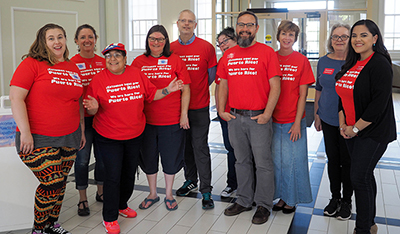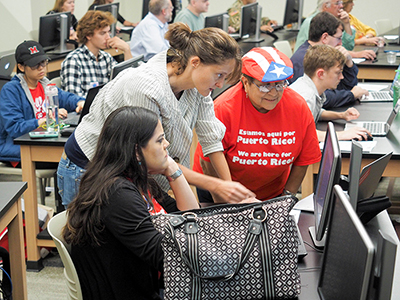Geography's mapathon unites faculty and students to help provide aid to Puerto Rico

Written by Bonnie Meibers, CAS communications intern

The team that made the mapathon happen on short notice (left to right): Jessica McCarty-Kern, Robbyn Abbitt, Roxanne Ornelas, Mary Henry, Bruce D'Arcus, Marcia England, Damon Scott, Debbi White, Sande Garner, Joanna Camacho
While the hurricane in Puerto Rico and its lasting effects may feel far away from Oxford, Ohio, Miami's Department of Geography decided to do something about it.
On Friday, September 29, the department applied its expertise in mapping and resource management to host a special mapathon to help the victims of Hurricane Maria.
Assistant professor of geography and American studies Damon Scott, who has Puerto Rican in-laws, organized the event, which brought together faculty members, students, and volunteers from across the Miami community.
"Feeling the local and regional impacts of climate change-induced extreme weather events, the month of September has been a rough one for lots of people throughout the Caribbean and southwestern U.S.," Scott said. "For me personally, it has involved responding to rapidly unfolding extreme weather events both by communicating with my family and loved ones in harm's way and by reflecting on the ways several previous such events have affected my family."
During the event, held in Shideler Hall, volunteers used satellite imagery and on-line mapping tools to help those in the ground in Puerto Rico know where buildings once stood. Another project looked at damage sustained by hospitals and medical clinics in the area.
Openstreetmap.org, or OSM, was used to trace the outlines of buildings. OSM is an online platform that uses Google Maps to enable people from around the world to participate in crowd-sourced mapping projects.

Mapathon team members (left to right) Joanna Camacho, Amélie Davis, and Roxanne Ornelas hard at work
Scott said that some of the projects OSM is used for are tied to humanitarian efforts to respond to specific crises around the world, like Hurricane Maria. Those projects are managed by the Humanitarian Open Street Map Team (HOT). Since Maria hit, the American Red Cross has requested a series of mapping projects for planning and conducting relief operations in Puerto Rico.
Altogether, 121 people participated in the mapathon.
"I was overwhelmed by the immediate and strong interest in the event," Scott said. "A number of participants revealed that they had family, friends, or colleagues on the island. Others were there to support their friends who have family in Puerto Rico. Several members of the Miami baseball team participated in a gesture of solidarity with their teammate from Guayama, in the southeast part of the island."
Mapathons, similar to the one held at Miami, are happening across the country.
Scott said that he ran across a flyer on Facebook for a similar event at Columbia University.
"I had never heard of OSM, or HOT, or mapathons before then, but I recognized that this would be a way that we would organize a local event to respond to the unfolding humanitarian crisis on the island," he said.
Working with colleagues in the Department of Geography — including experts in mapping and Geographical Information Systems like Robbyn Abbitt, Amèlie Davis, and Jessica McCarty-Kern — Scott came together to draft a set of instructions for the mapping exercise, develop promotional materials, sort out the logistics of coordinating the event across 5 different work spaces in Shideler Hall, and reach out to other, simultaneous mapathons on other campuses.
Participants received a "¡Presente!" sticker as a visible reminder that they showed up for Puerto Rico when they attended the mapathon.
The recovery effort in Puerto Rico is ongoing, and will be for quite some time.
"These extreme weather events are dramatic and draw lots of media attention when they occur," Scott said. "The aftermath, however, is drawn out and riddled with lots of very consequential decisions that also require thoughtful and deliberate attention. On an ongoing basis, we all need to be present when extreme weather events occur, to stay engaged in the consequential decisions that affect the most vulnerable among us, and to seek out ways to bridge the divides that separate us and cause us to forget our common humanity."
If you or your organization would like to participate in or co-sponsor future community mapping events, please contact Damon Scott (scottd2@MiamiOH.edu) or Robbyn Abbitt (abbittrj@MiamiOH.edu).
For more about Miami's hurricane relief efforts, read the October 12, 2017 press release Miamians pitch in with expertise and passion in Hurricane relief effort.

